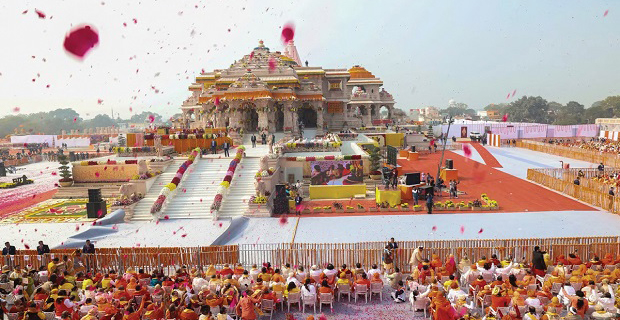A MOMENT OF NATIONAL RESURGENCE
New Delhi: The extensive ceremony of the inauguration of the Ram Temple at Ayodhya on January 22, with Prime Minister Narendra Modi as the principal invitee performing all the religious duties pertaining to the installation of the deity of Ram Lalla, has proved to be a national event that electrified the belief system of Hindus across India - including those who were living abroad. This happened in a manner not seen in this country’s history before.
The Prime Minister was at Ayodhya both as a Hindu and as the chief of the political executive governing the nation and this established, in the Indian context, the principle that holding a high political office did not mean that a leader should shy away from his or her religious commitments.
Secularism means that India granted complete freedom of worship and did not put a denominational stamp on the national or state government - it also at the same time, did not deny people in power their right to publicly own their faith.
Apart from the basic democratic concept of ‘one man one vote’ - that was in play regardless of caste, creed or gender - the only other secular requirement of governance would be that policy should not discriminate between sections of the citizenry.
The address of Prime Minister Modi was free of any suggestion of religious ‘exclusivism’ and it effectively countered the narrative of ‘majoritarianism’ and allegation of any other form of bias and largely focused on the importance of socio-cultural unity as a powerful instrument of national advancement.
The extraordinary turnout of people associating with the ceremony was no doubt driven by the historicity of the event - but they also had a clear perception that it is precisely the Hindu faith that alone had remained unacknowledged even after Independence. The fact that the temple construction was started only after the Supreme Court gave its judgement in its favour through a constitutional Bench - this was highlighted by the Prime Minister - freed the event of any communal projections. If the inauguration of Ram Temple at Ayodhya enhances the political status of Prime Minister Modi in the eyes of the people, nobody can grudge it - the voter, it should be remembered, is an astute judge of the merit of the rulers.
In his scintillating address on the occasion, Prime Minister Modi declared that Lord Ram was the ‘spirit of the Constitution’ and Ram Temple a ‘symbol of national consciousness’ that liberated the people from ‘slavery’ and a ‘colonial mindset’. This latter was a reference to the historical subjugation of the Hindu religion as also to the British game of dividing India into communities and creating a minority-majority issue in politics.
He validated the place of glory that Hinduism enjoyed in India’s nationalism by affirming that “Ram is the faith of India, the foundation of India and the idea of India” and went on to add that “Ram was also the law of India, the leader of India as well as the policy of India”.
He put a stamp of eternity on it by saying that Ram was not only the present but also the future of India. The speech was remarkable for steering clear of any sectarian overtones and for emphasising how the story of Ram established that differences between ‘high’ and ‘low’ did not exist for him.











Comments.